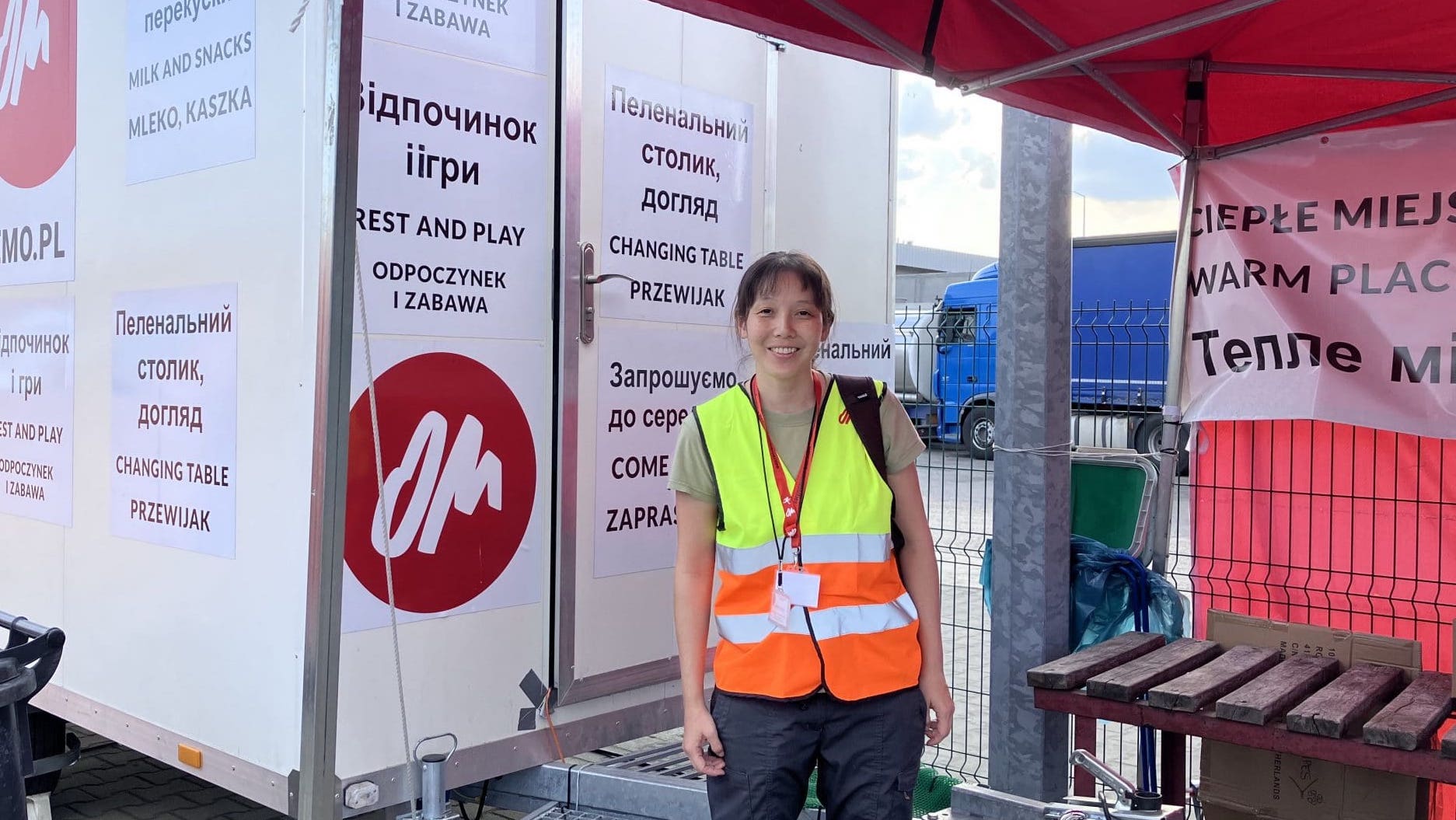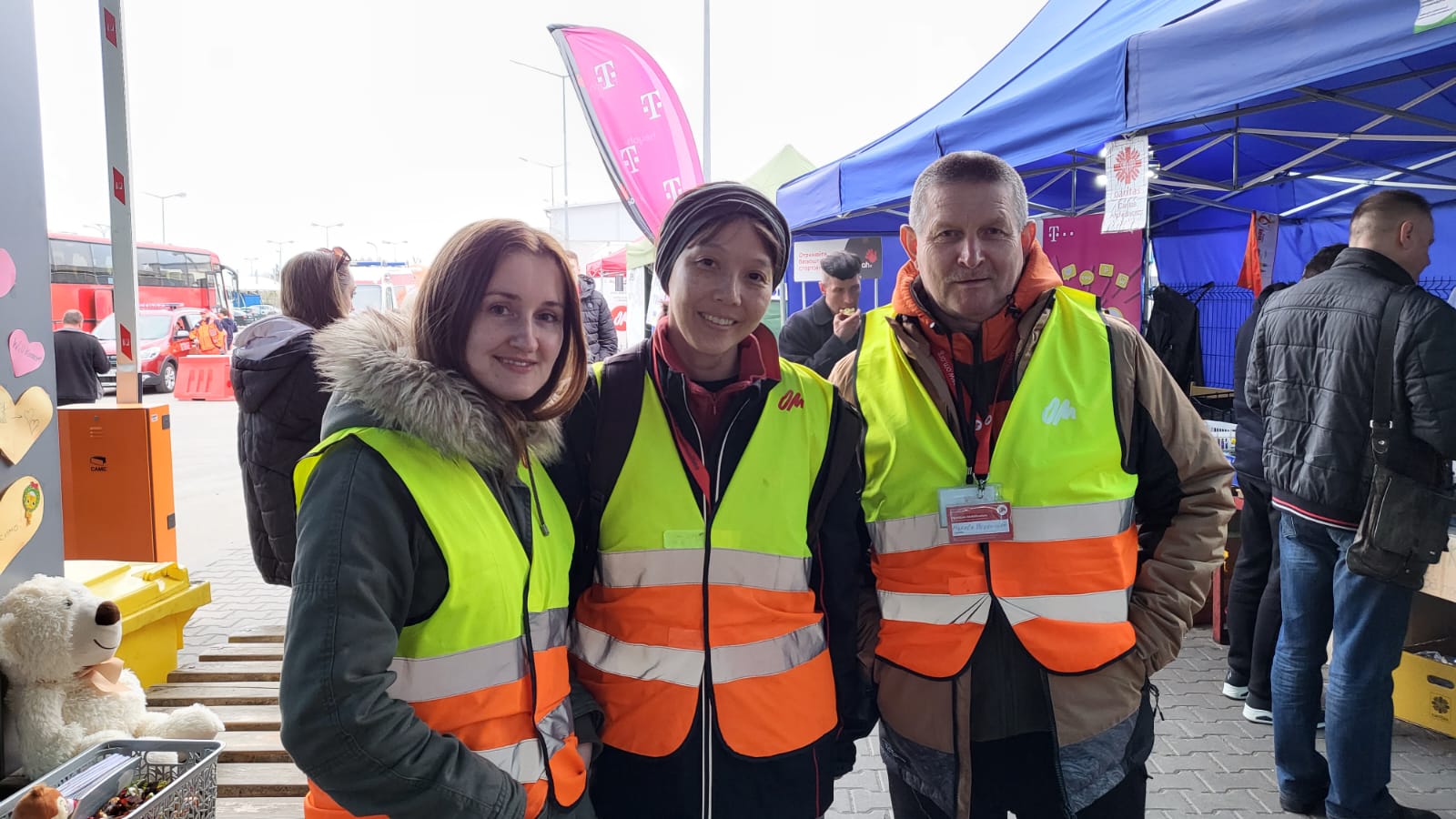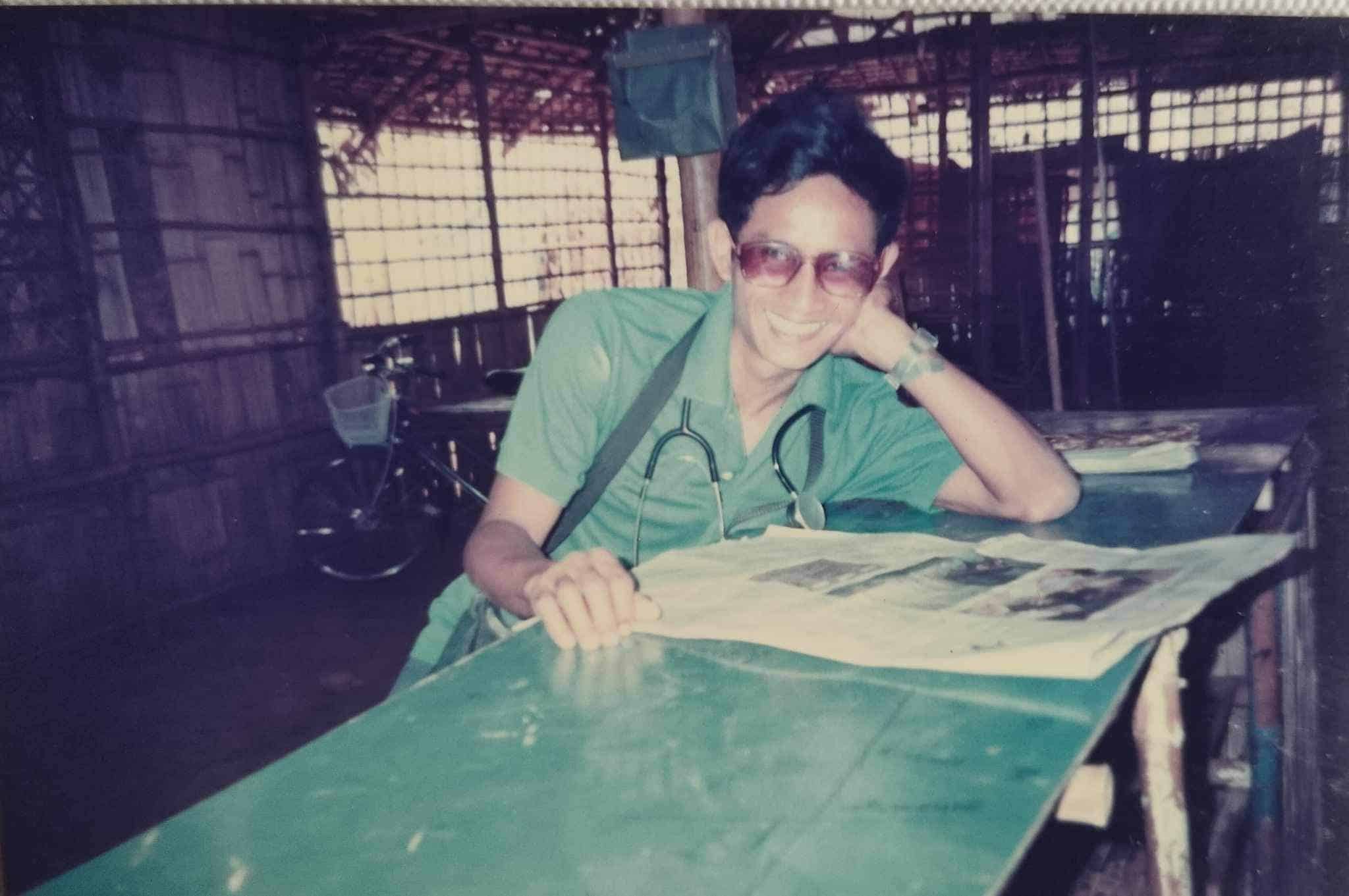“The Gospel is made for crisis”: Singaporean mother who dropped everything to help displaced Ukrainians
This World Refugee Day, would you commit to seeking God's heart for the over 100 million forcibly displaced people in the world today?
Sharon Ong // June 20, 2022, 4:52 pm

“It is the mandate of the Christian Church to move out of safety and into the difficult places of the world,” says Salt&Light contributor Sharon Ong, who went to Poland to serve Ukrainian refugees. All photos courtesy of Sharon Ong.
The countryside was crisp, bright and absolutely beautiful. Birds were singing and trees were budding.
Winter had just given way to spring and the Polish-Ukrainian border was completely serene – a far cry from the masses of stressed out crowds we saw in the news.
I started my first shift with the team from Operation Mobilisation (Poland) on April 24. It was the day of Orthodox Easter, an important festival for the Ukrainian people.
My picture of Ukraine was intimately informed by personal, human stories.
I said a prayer of thanksgiving, that after two months of war, Ukrainians had enough capacity to control their evacuations, their travel and their future planning; that they could choose to leave on a day other than Easter.
They had more than 15 minutes to pack and flee, they didn’t have to queue at the border for hours in the bitter cold, and they were already adapting – resilient and resolute after the initial shock of invasion.
It was difficult to report this back to concerned people who were asking me how things were over there, expecting me to give them a picture of shelling and mass chaos.
Nope. I missed that by about six weeks.
With the consistent news coverage in Singapore, I told them they were probably more well-informed than I was at that time.
No words, just emotions
My picture of Ukraine was intimately informed by personal, human stories.
I had the privilege of receiving people into Poland, understanding their stories (each as different as the cities they came from), giving what help I could, and standing in solidarity with them as the body of Christ.

Sharon Ong (centre) with teammates from OM Poland at the border ministry, serving refugees who were crossing the border from Ukraine into Poland.
My team offered weary travellers tea, coffee, snacks, chocolates and little travel packs for children, after which they were taken to evacuation centres or train stations in the city. We warmed them, encouraged them, gave them information and sometimes prayed for them.
My fervent prayer was that this situation would have hope. Three months later, there certainly is.
Even though I couldn’t speak Ukrainian (and it was so frustrating for me), the emotions communicated powerfully.
The mothers, in particular, would give us looks of gratitude and relief that I, as a mother of two young children, understand well but have difficulty putting into words.
It’s like being in a state of extreme tension and anxiety while bearing the exhaustion of holding everything together physically, emotionally and mentally, needing to be strong for your children. When somebody kneels down, looks into your child’s eyes and blesses them with a snack or a juice, it unlocks the heavy burden that you have been carrying all by yourself.
Fleeing disaster is distinctly harder with little children – Jesus talks about it in Matthew 24:19. It’s just hard being responsible for another life.
And when we look at children, our vision expands to see that it is their futures that are the most affected. Out of everyone involved, they are the least deserving of all this.
Light in the midst of crisis
When I was talking to God about the war, one of the songs that was playing was O Lord by Lauren Daigle. It has a line that goes: “I will stand my ground where hope can be found.”
My fervent prayer was that this situation would have hope.
This was during the initial hard days around Feb 24-28, when the world waited with bated breath to see if Russia would saunter in, destroy the government of Kyiv and help themselves to anything they wanted.
Three months later, there certainly is hope.
This war has brought out the best from Christian churches across Europe who have united their hands and their networks in serving the refugees.
The Gospel is made for crisis. Christianity shines brightest in the midst of difficult situations.
One woman told us that it was the actions of the churches in Ukraine – delivering aid, evacuating people at the risk of their own lives, coordinating help and serving the people – that made her change her mind about Christians.
Thus she wanted to become a Christian, and asked us for a Bible.
Her face was alight with joy as she sat on the bus seat, eagerly opening it on her lap.
I’m definitely not saying that war is good, but Christians have a hope when things seem hopeless; we have the Creator of the universe who cares about us, and we can call upon Him when we are afraid and in danger.
I heard accounts of terrifying evacuation journeys – some were shot at in their convoys out of occupied territories. In their words: “If the Lord had not protected us, we would not be alive.”
Difficult situations usher in a desperate longing for a God who is sovereign and in control. The Gospel is made for crisis. Christianity shines brightest in the midst of difficult situations. Look at the Bible and the circumstances of the Acts church.
Responding to my heart’s cry
As volunteers in this crisis, many of us struggle to articulate our motivations in ways that don’t come across as disaster tourism, fame seeking, heroic or boastful.
I went because I wanted to be physically present at the place my heart had been crying for since the war broke out.
In large-scale humanitarian crises, there is always a shortage of workers and resources. I went knowing there would be somewhere to help at, as each border crossing, church and city all across Europe was attending to refugees in various capacities. I was assured that we would not be a burden on overstretched transport, accommodation and food services because we could tap on the EU’s infrastructure.
Difficult situations usher in a desperate longing for a God who is sovereign, who is in control.
On the ground, I met one person sceptical about the cost of my going all the way there. Another treated me like I was Mother Teresa in the flesh, and more than a few were surprised but moved that a Singaporean cared enough to be there.
I was not trying to “achieve” anything except to be present and available for God to use me … or not.
Like myself, some Singaporeans feel drawn to the people of Ukraine out of empathy. While the door is open for many to serve, it is important that we critically assess our motivations. For this work, as in all missions work, we need to come with a posture of humility, flexibility and a desire to serve.
First, do no harm. Second, the key words in humanitarian crises are not discipleship, preaching, training and evangelism. Think rather in terms of presence, support, solidarity and comfort.
In a sense, although I didn’t do much, I can say even my own presence at the border added a little bit more light and hope.
Sharing in the suffering of our fellow man
I truly believe it is the mandate of the Church to move out of safety and into the difficult places of the world; any place where people are needing hope, love and a Saviour.
We don’t hear this enough in Singapore churches except maybe from the occasional missions month pitch. What our young people tend to hear are the voices of society, perhaps even their own parents: “You need to become successful enough to be financially stable and comfortable. That is your only reason for existing.”
What about God’s reason for our existence?
It is our great privilege that God has showered us in His love so that we can give it away. As fellow sons and daughters of God, we share in the sufferings of those who suffer.
Singaporean churches have been blessed with many resources. What are we going to do with them?
Operation Mobilisation (OM) lives out God’s love in 120 fields and through the Logos Hope ship. If you would like to know more, please visit: www.sg.om.org.
RELATED STORIES:
Break my heart, Lord, for what breaks yours: Refugees, missions and you
We are an independent, non-profit organisation that relies on the generosity of our readers, such as yourself, to continue serving the kingdom. Every dollar donated goes directly back into our editorial coverage.
Would you consider partnering with us in our kingdom work by supporting us financially, either as a one-off donation, or a recurring pledge?
Support Salt&Light



